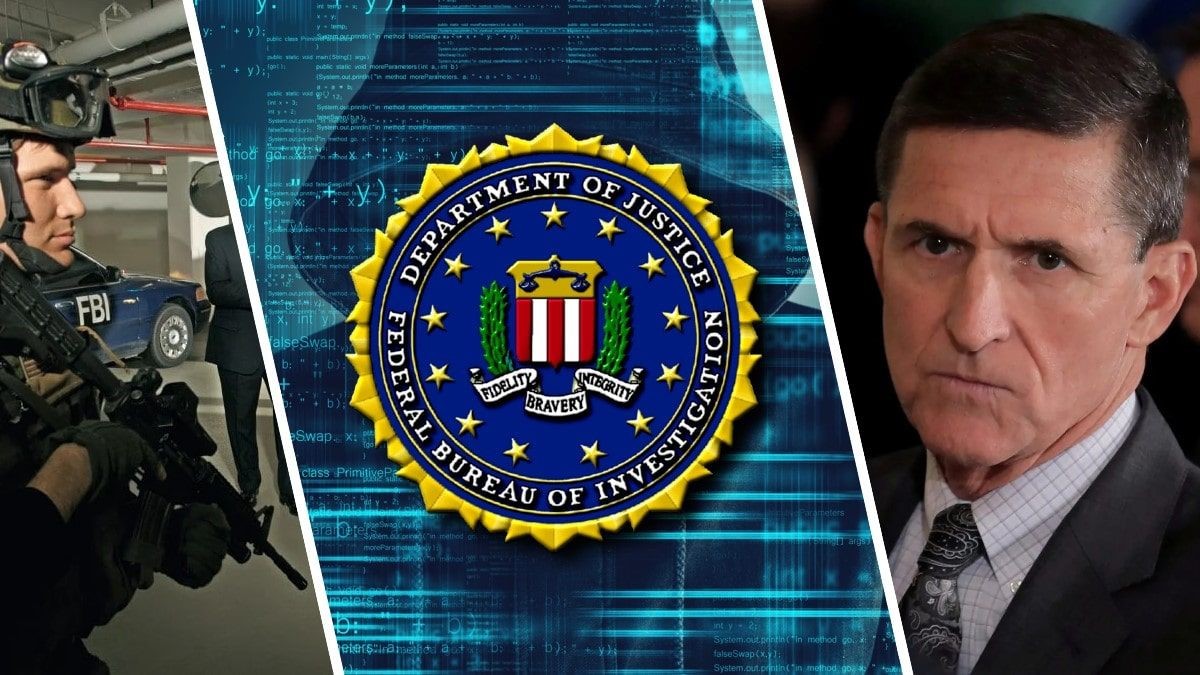As first reported by Tracy Beanz of UncoverDC and Adam Carter of The Washington Pundit, some stunning details were included in Lt. Gen. Michael T. Flynn's (Ret.) recent complaint with the White House Office of Management and Budget (OMB) seeking $50 million for "unjustifiable, outrageous, and malicious prosecution."
 From Gen. Flynn's Feb. 24, 2022, OMB Complaint
From Gen. Flynn's Feb. 24, 2022, OMB Complaint
The complaint filing is an administrative requirement that must be completed before a lawsuit can be brought by a former White House employee, stemming from Gen. Flynn's service as President Trump's first National Security Advisor (NSA) in early 2017. Seeing as the complaint is filed with an office of the Biden "Hey, why don't we try using The Logan Act" White House, it is likely dead-on-arrival, and a formality foreshadowing an impending lawsuit Gen. Flynn intends to file in the near future.
Attached to the OMB complaint was a summary of the allegations of the political targeting and the weaponization of the power of the United States federal government by the FBI, DOJ, Obama administration officials (some held over into the Trump administration), up to and including President Barack Obama, and then-Vice President Joe Biden themselves—to "get Flynn" at all costs. A detail that seemed to escape the notice of many was the revelations that the FBI had obtained surveillance warrants from the Foreign Intelligence Surveillance Court (FISA Court or "FISC") in order to spy on Gen. Flynn's electronic communications as part of the now-discredited Trump-Russia Collusion Investigation.
 From Gen. Flynn's Feb. 24, 2022, OMB Complaint
From Gen. Flynn's Feb. 24, 2022, OMB Complaint
The day after the news broke, Tracy Beanz discussed the impact of the FISA warrants on the Dark To Light podcast with Michael Opelka. The ramifications for Gen. Flynn are apparent. During the time the FISA warrant(s) were issued—as well retroactively back six months—the FBI would have unfettered access to any of Gen. Flynn's electronic communications without his knowledge or need to notify him after the fact. Independent journalist Harold Finch pointed out that due to the FISA "Three Hop Rule," the FBI would also have free rein to surveil the electronic communications of anyone Gen. Flynn messaged and anybody those individuals messaged. This potentially included all the members of the Trump campaign and transition team, including President Trump himself. Additionally, Flynn family members, business associates, government contacts, advisors, even journalists, and their sources who Gen. Flynn may have interacted with, and many others could potentially be surveilled due to the FISA Three Hop Rule.
Segment from the May 18, 2022, Dark To Light podcast - 'Sussmann, Flynn, And Saving Our Kids'
Another revelation in the filing should raise the antennas of those who have followed Spygate closely. The OMB complaint specifically accuses FBI Special Agent Joseph "Joe" Pientka of having "made multiple false statements to the [FISC] in order to secure surveillance warrants." For those unaware, Joseph Pientka was the other FBI agent in the room besides Peter Strzok during the infamous Jan. 24, 2017, meeting with Gen. Flynn in the White House. This meeting was the basis for the charges of Making False Statements to Federal Investigators brought by the Mueller Special Counsel Office (SCO) as part of the Russia collusion hoax.
 From Gen. Flynn's Feb. 24, 2022, OMB Complaint
From Gen. Flynn's Feb. 24, 2022, OMB Complaint
Pientka was also the FBI agent who was inserted into an Aug. 17, 2016, national security briefing of then-candidate Donald Trump. Pientka was to observe Gen. Flynn—who was also in attendance as a campaign advisor—as part of the Crossfire Razor investigation. Crossfire Razor was the code name given by the FBI to the investigation into Gen. Flynn as part of the FBI's larger investigation into Trump-Russia collusion code-named Crossfire Hurricane.
 From Gen. Flynn's Feb. 24, 2022, OMB Complaint
From Gen. Flynn's Feb. 24, 2022, OMB Complaint
This is not the first time Pientka's role in the Flynn investigation has been brought into serious question. Then-Chairman Charles "Chuck" Grassley sent a May 11, 2018, letter to then-Deputy Attorney General Rod Rosenstein and FBI Director Chris Wray as part of a Senate Judiciary Committee inquiry into the investigation of Gen. Flynn. Grassley requested documents related to Pientka (and Strzok) in the Flynn investigation be provided, and Pientka be made available for questioning by the Committee's staff.
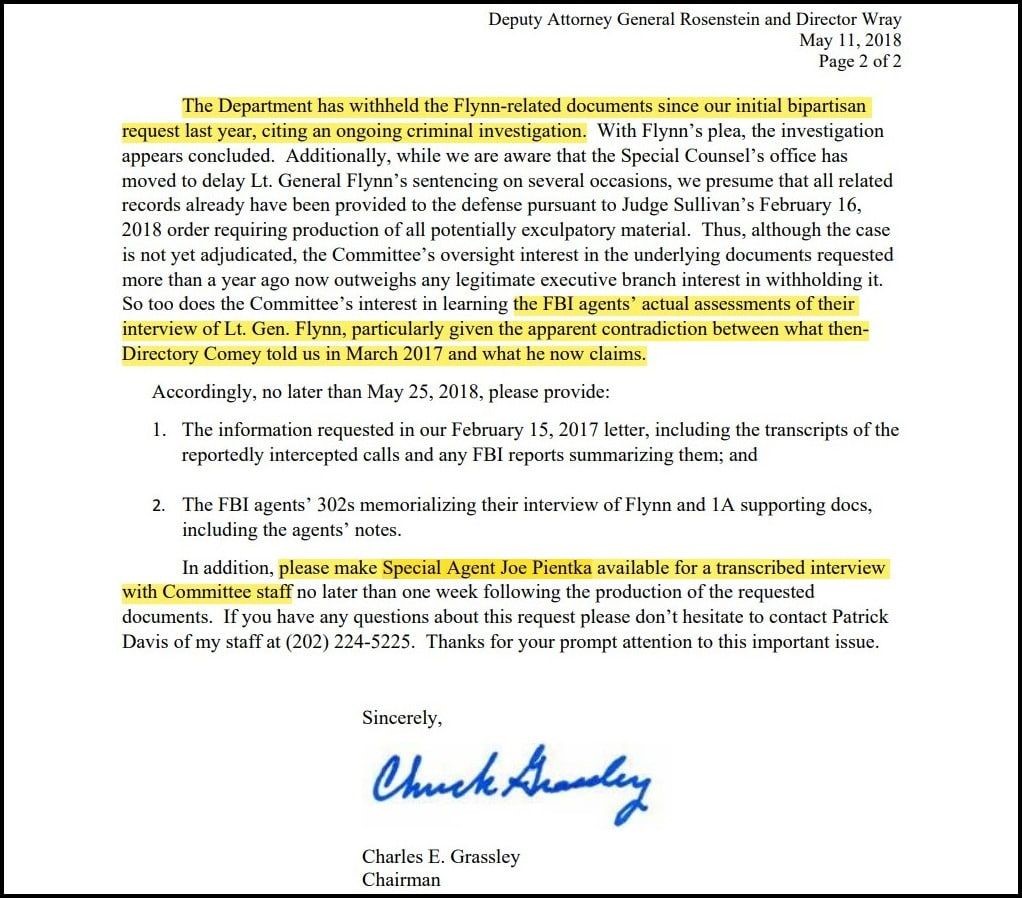 From the May 11, 2018, letter from Sen. Grassley to Deputy AG Rosenstein and FBI Director Wray
From the May 11, 2018, letter from Sen. Grassley to Deputy AG Rosenstein and FBI Director Wray
This is also not the first time Pientka has been implicated in falsifying evidence before the FISC in order to obtain FISA surveillance warrants on Trump campaign officials. As detailed in a March 2020 report by Inspector General (IG) Michael Horowitz, the applications for all four FISA warrants on Trump campaign advisor Carter Page contained "serious errors and omissions." Although not listed by name, it was widely reported by Techno Fog, The Last Refuge, and Gregg Jarrett of Fox News; and later confirmed by Sen. Grassley that "Supervisory Special Agent" (SSA-1) was indeed FBI agent Pientka. As Horowitz's IG Report states:
"[T]he FBI [completes] the FISA verification process known as the Woods Procedures … [T]he supporting documentation into a Woods File, perform[ed] the field office database checks on Carter Page, and complet[ed] the accuracy review of each fact asserted in the FISA application. His supervisor for the Carter Page investigation, SSA 1 [Pientka], was responsible for confirming that the Woods file was complete and for double-checking the factual accuracy review to confirm that the file contained appropriate documentation for each of the factual assertions in the FISA application." ~ From IG Horowitz's report on the Woods Procedures related to Crossfire Hurricane FISA Applications
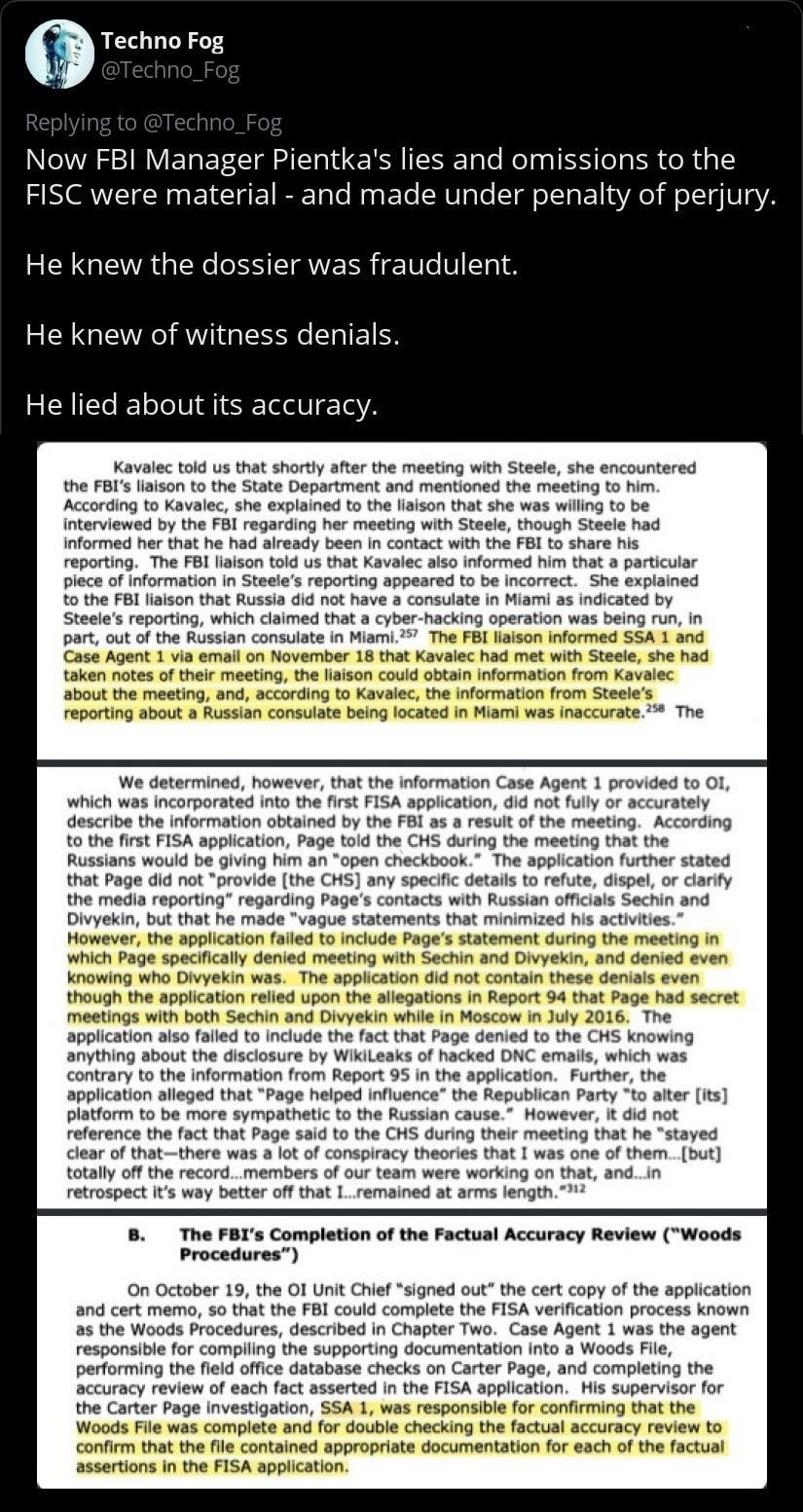 From the Twitter account of @Techno_Fog, who can be found at 'The Reactionary' on Substack
From the Twitter account of @Techno_Fog, who can be found at 'The Reactionary' on Substack
The OMB complaint filed by Gen. Flynn explicitly highlights several times throughout the document Pienkta's role in making false statements to the FISC in order to obtain FISA surveillance warrant(s) on Flynn. This naturally leads to the question, "Why?"
 From Gen. Flynn's Feb. 24, 2022, OMB Complaint
From Gen. Flynn's Feb. 24, 2022, OMB Complaint
Where have you gone, Joe Pientka?
Joe Pientka has been a mysterious figure in the Flynn and Spygate sagas since the beginning. Very few photographs of him are publicly available outside of a couple of him seen alongside other Crossfire Hurricane figures inside the Capitol for congressional hearings.
 From left to right: FBI agents Joe Pientka (in SWAT gear), Joseph Persichini Jr., Jennifer Smith-Love, and Stacey Moy as identified in a 2007 article by the Washingtonian
From left to right: FBI agents Joe Pientka (in SWAT gear), Joseph Persichini Jr., Jennifer Smith-Love, and Stacey Moy as identified in a 2007 article by the Washingtonian
As previously mentioned, Pientka attended the Jan. 24, 2017, meeting in the White House alongside Strzok, but seemed to almost immediately drop off the Crossfire Razor investigation. As revealed in text messages between Strzok and his mistress, FBI Attorney Lisa Page, just a few weeks later, on Feb. 10, Strzok and Page appear to have edited Pientka's FBI FD-302 form—the FBI form used by the agents to summarize details of the Flynn meeting.
 Transcripts of text message conversations between FBI agent Peter Strzok and FBI lawyer Lisa Page from the Twitter account of Undercover Huber (@JohnWHuber). Photos and highlights added by Undercover Huber for clarification and emphasis.
Transcripts of text message conversations between FBI agent Peter Strzok and FBI lawyer Lisa Page from the Twitter account of Undercover Huber (@JohnWHuber). Photos and highlights added by Undercover Huber for clarification and emphasis.
*[Editors Note: These excerpts are taken from the screenshots above. Transcripts shown in white appear to be text messages from FBI phones. The transcript in blue seems to be from the separate, internal FBI office "Lync" Instant Messaging (IM) system, which can make the chronological quotes seem somewhat non-contiguous.]
Feb. 10
Page (IM): This document pisses me off.? You didn't even attempt to make this cogent and readable.?
Strzok (Text): Hey I was considering what you said, please just drop off what you have, I will incorporate it tonight /tomorrow and email back out to you. Thanks for your time on it.
Page (Text): It's fine. Unrelated, but you need to finalize that asap. I [wouldn't] be surprised if following this evening's events that a request comes in to see it.
Strzok (Text): … I'm going back in tonight to do so
Page (Text): I gave my edits to Bill [Priestap] to put on your desk.
Strzok (Text): … [T]hank you. I appreciate your time.
Strzok (IM): Lisa, you didn't see it before my edits that went into what I sent you. I was 1) trying to [not] completely re-write the thing so as to save [presumably Joe Pienkta's] voice and 2) get it out to you for general review and comment in anticipation of needing it soon. I greatly [appreciate] your time in reviewing and your edits. I incorporated them. Thank you.
Strzok (IM): I did the edits better than IMing
Page (Text): Yes, it's no problem. You can say I emailed you to tell you I left them with you.
Strzok (Text): I made your edits, and sent them to Joe [Pienkta]. I also emailed you an updated 302. I'm not asking you to edit it this weekend, I just wanted to send it to you.
Strzok (Text): And hopefully it doesn't need much more editing. I will polish it this weekend, and have it ready for Monday. I really appreciate your time and edits.
Feb. 14
Strzok (Text): Also, is Andy [McCabe] good with [the Flynn] 302?
Page (Text): Launch on [the Flynn] 302
Strzok (Text): K thank you.
~ Excerpts from transcripts of text message conversations between FBI agent Peter Strzok and FBI lawyer Lisa Page.
The declassified text message conversations between Strzok and Page seem to indicate they were making significant revisions to Pienkta's 302 of the Flynn interview. This would be highly unusual since Strzok would have completed his own 302 from the meeting to tell his recollection of what transpired in his own words. Lisa Page was not even in attendance, so it is simply inconceivable her edits would provide a more accurate recounting of what occurred.
 (Left) former FBI attorney Lisa Page and (Right) former FBI agent Peter Strzok
(Left) former FBI attorney Lisa Page and (Right) former FBI agent Peter Strzok
Just as concerning is Strzok saying he "was trying to not completely re-write the thing" and "to save Joe Pienkta's voice." This may suggest Pienkta was either unwilling or, by that time, no longer trusted to make the revisions himself.
As detailed on Twitter by noted legal columnist Techno Fog, Pientka was transferred from Washington DC to the San Francisco FBI Field Office in the summer of 2019—a year after the FISC was alerted to the "deficiencies" in the FISA applications on Carter Page he was charged with reviewing. Since that time, he has to our knowledge, not been seen publicly and shielded by the FBI and DOJ from congressional inquires. It is also interesting to note when the news became public about Pienkta's role in the illicit Carter Page FISA warrants, the FBI San Francisco Field Office appeared to scrub any reference of Pienkta from its website.
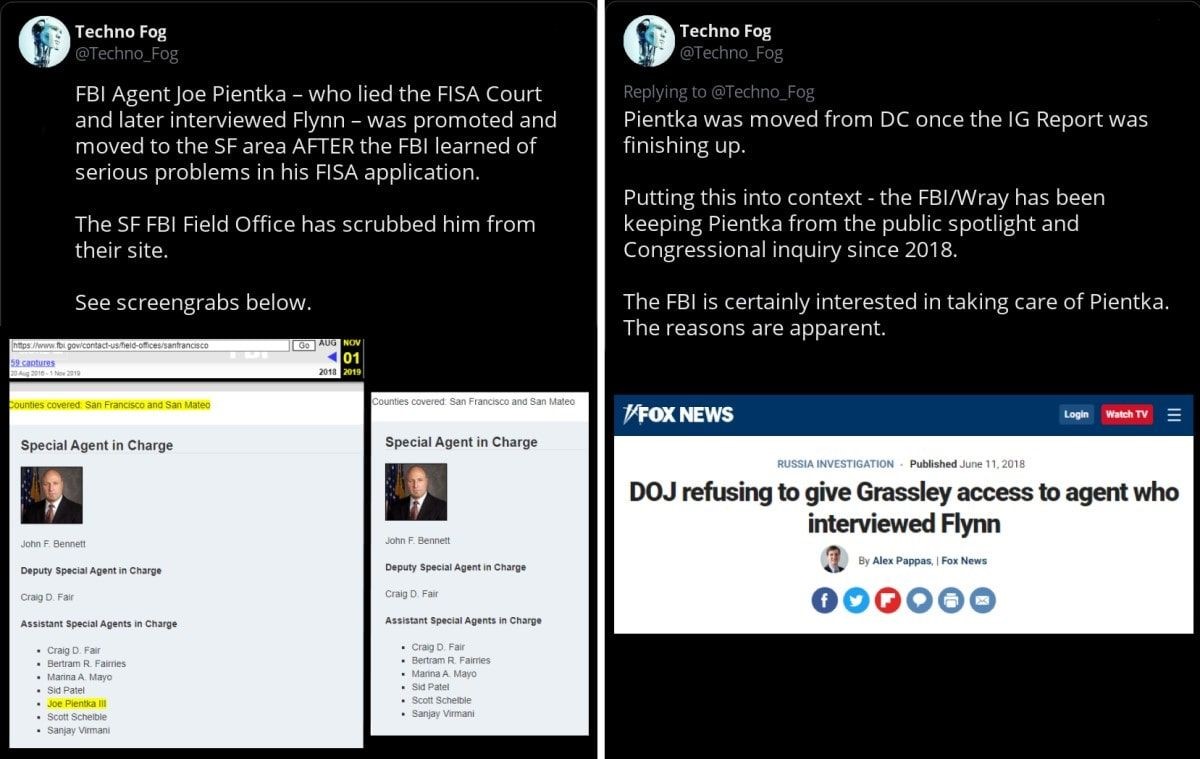 From a Twitter thread by @Techno_Fog
From a Twitter thread by @Techno_Fog
Speculation has varied about the reasons for Pientka's transfer, apparent disappearance from the public spotlight, and subsequent unavailability to congressional oversight investigations. Perhaps Pientka's role in the Carter Page FISAs came to light early through some internal FBI/DOJ, IG, or congressional investigation—similar to the one Congressman Devin Nunes was running as part of the House Permanent Selection Committee on Intelligence (HPSCI) that was detailed in Lee Smith's book (and later movie by Amanda Milius) The Plot Against The President. This could have embroiled him in his own internal investigation and taken him off active casework or might have made the FBI & DOJ believe he was too toxic to participate further in the Crossfire Razor and Crossfire Hurricane investigations because it would send up too many red flags.
Flashback to a segment of the Jan. 13, 2020, Dark To Light podcast "The Problem With FISA," where Beanz and Frank discussed a Twitter thread by @Techno_Fog on the whereabouts of FBI agent Joe Pientka
Another possibility is that Pienkta simply refused to participate any further. By February 2017, Crossfire Hurricane and Crossfire Razor were already well over half a year old. He had already assisted in securing four bogus FISA warrants against Carter Page and likely the FISA(s) on Gen. Flynn—which had yielded absolutely no evidence of collusion with Russia or Vladimir Putin. Career agents at the FBI had already twice attempted to close Crossfire Razor in early November 2016 and again in early January 2017 on the grounds there was no basis to investigate Gen. Flynn for anything further.
The refusal to close the case due to actions by the upper echelons of the FBI leadership (i.e., "The 7th Floor") and Strzok himself led career FBI agents in the DC Field Office to message each other such things as "We didn't find anything else from the investigation about him" and "This is a nightmare." There is even an exchange by field agents in DC on Jan. 10, 2017, stating they—and employees at the CIA—"all went and purchased professional liability insurance" due to their work on Crossfire Razor. So it is clear there was widespread angst among other FBI officials working with Pienkta about their continued involvement in the investigation into Gen. Flynn.
The plot against Trump and Flynn was spinning out of control throughout January 2017 and went off the rails with the infamous Jan. 5 Oval Office meeting first exposed in Susan Rice's "By The Book" CYA (Cover Your A**) memo to herself.
 From Gen. Flynn's Feb. 24, 2022, OMB Complaint … not quite how Susan Rice described it
From Gen. Flynn's Feb. 24, 2022, OMB Complaint … not quite how Susan Rice described it
There are also the handwritten notes from then-FBI Asst. Director of Counterintelligence Bill Priestap, during a meeting of the FBI National Security Division (NSD) on Jan. 24, 2017 (earlier the same day as the Flynn White House meeting) where he asked:
"What's our goal? Truth/Admission or to get him to lie, so we can prosecute him or get him fired?" ~ From Bill Priestap's Jan. 24, 2017, handwritten notes from a meeting of the FBI NSD filed in Gen. Flynn's trial of Making False Statements to Federal Investigators.
 Screenshot of Bill Priestap's handwritten notes from the Jan. 24, 2017, meeting of the FBI NSD
Screenshot of Bill Priestap's handwritten notes from the Jan. 24, 2017, meeting of the FBI NSD
The Priestap notes proved beyond all doubt that the FBI had intended to set up and entrap Gen. Flynn in a bogus process crime when they did not have a predicate to investigate further or even to begin with. The fact a high-ranking FBI official would put down in writing prima facie evidence of such illicit corruption was shocking. Given everything else that happened up to that point, it is possible Priestap did so simply out of hubris, believing he and the rest of the FBI & DOJ plotters were above the law and would never face investigation or accountability.
 Bill Priestap testifying at a 2017 hearing in front of the Senate Intelligence Committee
Bill Priestap testifying at a 2017 hearing in front of the Senate Intelligence Committee
It is equally as likely that Priestap recognized the investigations were crossing well over the line between rampant corruption into blatant illegality. He very well may have been penning himself a "Get Out of Jail Free Card" so he could later claim he was the lone voice of reason in the room if/when the plot against Gen. Flynn and President Trump was exposed.
Pientka was likely in the same meeting to discuss the planned setup of Flynn that he would attend alongside Strzok later the same day. He probably was at least as aware—and perhaps more so—of the line being crossed. It would later be shown in a Jan. 25 NSD memo from the very next day that both Pientka (as well as Strzok) "advised that General Flynn was very open and forthcoming" and "believed Flynn believed what he was saying was true." So it stands to reason when Pientka (or any decent human being for that matter) was later asked to amend his 302 report to state Gen. Flynn had lied, that may have been the moment Pientka refused to go along any further and what led to Strzok and Page having to heavily edit his 302 of the Flynn interview.
A third possibility has been floated that Pientka may have turned whistleblower. His transfer to the FBI San Fransisco Field Office may have been done to guard him against retaliation from colleagues in the DC Field Office and "The 7th Floor" for coming forward. This could explain how the FBI & DOJ were able to keep Pientka away from congressional investigators, claiming he was a cooperating witness in an ongoing internal or criminal investigation.
It could also explain how Flynn's legal team became aware of Pientka's role in obtaining a FISA surveillance warrant taken out against the General before it was publicly reported. In order to make declarative statements in the OMB complaint such as, "[The] FBI lied to the FISA court" and "Pientka made multiple false statements to the [FISC]," they would need a pretty ironclad basis to assert such statements of fact. That's not something a lawyer as accomplished Flynn attorney Jesse Binnall is just willy-nilly going to throw into a complaint seeking $50 million. They would likely need some type of official document or acknowledgment from the DOJ or IG attesting to it as fact or evidence that would constitute a rock-solid foundation to make the claims. A whistleblower complaint could certainly provide that.
When did the FBI have a FISA on Gen. Flynn?
There is nothing included in the Flynn OMB Complaint documents that indicate when FISA surveillance warrant(s) were issued against Gen. Flynn, if they were ever renewed, and if so, how many times. This is conjecture on our part, but based on the timeline of the Crossfire Razor investigation, we can propose a reasonable hypothesis.
On Aug. 15, 2016, in response to a text from Lisa Page fretting about the possibility that Trump could get elected President, Strzok sent a reply regarding an "insurance policy."
 Transcripts of text message conversations between FBI agent Peter Strzok and FBI lawyer Lisa Page from a filing in the Flynn trial
Transcripts of text message conversations between FBI agent Peter Strzok and FBI lawyer Lisa Page from a filing in the Flynn trial
The next day on Aug. 16, Strzok formally opens the Crossfire Razor investigation into Gen. Flynn.
 Screenshots of the FBI form completed by FBI agent Peter Strzok on Aug. 18, 2016, to open the Crossfire Razor investigation into Gen. Flynn from a filing in the Flynn trial
Screenshots of the FBI form completed by FBI agent Peter Strzok on Aug. 18, 2016, to open the Crossfire Razor investigation into Gen. Flynn from a filing in the Flynn trial
On the following day after that, on Aug. 17, Pientka is inserted into the national security briefing of then-candidate Donald Trump to observe Gen. Flynn as part of Crossfire Razor.
If based on Pientka's observations from the Aug. 17 meeting—along with whatever "evidence" the 'Crossfire cabal' could gin up—an application for a FISA warrant on Gen. Flynn was presented to the FISC and granted. The FISA warrant would have been active for 90 days until it expired or needed to be renewed in late November 2016.
As revealed by then-Acting DNI Richard Grenell's declassification of Obama administration officials who requested the unmasking of Gen. Flynn's name in classified intelligence intercepts, those unmaskings did not begin until late November / early December 2016—so roughly around the same time as a FISA issued in late August 2016 would have been set to expire. And there were a shocking number of requests throughout December 2016 and January 2017 (49 requests from 16 Obama administration officials in all), but no requests before then, when Crossfire Razor was in full swing, or afterward. If a FISA were in effect during that time, there would be no need to unmask Gen. Flynn's name in any intelligence report since the FBI would have unfettered access to all of Gen. Flynn's electronic communications.
 Screenshots of the list of unmasking requests of Gen. Flynn in classified intelligence intercepts by Obama administration officials from Nov 2016 to Jan 2017 declassified by Acting DNI Ric Grenell in May 2020
Screenshots of the list of unmasking requests of Gen. Flynn in classified intelligence intercepts by Obama administration officials from Nov 2016 to Jan 2017 declassified by Acting DNI Ric Grenell in May 2020
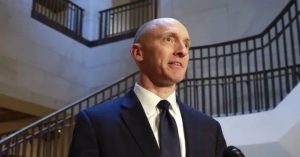 Carter Page interviewed after testifying during a congressional hearing in 2017
Carter Page interviewed after testifying during a congressional hearing in 2017
It seems unlikely that Pientka would have been involved in preparing and reviewing a FISA application and its related Woods file after January 2017. He was not even completing his own 302 form of the Jan. 24 Flynn meeting. However, he would have been neck-deep in preparing FISA applications and Woods files in the late summer of 2016 since his name is all over the Carter Page FISA application and three subsequent renewals.
Given all those facts, it is reasonable to hypothesize that a single FISA surveillance warrant issued against Gen. Flynn in late August or early September 2016 expired after the initial 90-day period. Either the FBI did not attempt to renew it, or the FISC denied the FBI's renewal application, and any attempt to obtain a new FISA after Gen. Flynn had been forced out as Trump's NSA would have likely been too risky given the media attention on Flynn by that point.
Why did Gen. Flynn have to be taken out?
In closing, we would like to remind the readers that the reason for removing Lt. Gen. Michael T. Flynn (Ret.) as President Trump's NSA was priority number one for the Deep State. And why the FBI, DOJ, and Obama acolytes had to go to all this trouble to set up and frame an American war hero—with a sterling reputation and an impeccable 33-year career in the United States Army—who has been described as "the top military intelligence officer of his generation."
President Trump was a political novice and completely unfamiliar with the way Washington DC worked—particularly the way "Deep State" actors within the law enforcement, military, and Intel apparatus operated and wielded power. Having been the Director of the Defense Intelligence Agency (DIA) under President Obama (by some estimates, the largest intelligence agency in the world), Gen. Flynn knew how the US Intelligence Community (IC) operated—where there were flaws and problems, and outright corruption. He knew where all the proverbial "bodies were buried."
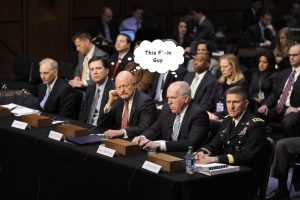 Gen. Flynn at a hearing of Pres. Obama's Intel Chiefs in front of Senate Intelligence Committee … one of these things is not like the others.
Gen. Flynn at a hearing of Pres. Obama's Intel Chiefs in front of Senate Intelligence Committee … one of these things is not like the others.
On both the Republican and Democrat sides, nearly the entire establishment IC, outside of Gen. Flynn, had vehemently opposed Trump's election. The IC knew Trump intended to "Drain the Swamp," and Gen. Flynn was the Drāno. Once Gen. Flynn was taken out, Trump was blind and unprotected.
Flynn also knew where all the good actors, or "white hats," were within the IC. During the transition period, anyone Gen. Flynn had identified as a candidate for appointment or promotion to a national security position in the Trump administration could then be targeted for the same type of investigation, political persecution, and weeded out of government. Or they simply ran and hid or got out themselves once they saw what happened to the "King of the White Hats," not wanting to suffer the same fate as Gen. Flynn through no fault of their own. Trump allowing himself to get steamrolled by the Deep State and firing Gen. Flynn so soon after taking office was quite simply the worst decision of the entire Trump presidency. From that point forward, Trump was a sitting duck for the Deep State.
Defense attorney Robert Barnes gave an excellent summary of why Gen. Flynn had to be taken out, and the Deep State's methods to accomplish it in an April 2020 episode of American Countdown (coincidentally as an introduction to his deep-dive interview of Tracy Beanz about the Flynn case). It's worth the time to listen.
Attorney Robert Barnes on American Countdown in Apr 2020 on why Lt. Gen. Michael T. Flynn (Ret.) had to be set up and taken out as National Security Advisor right at the beginning of the Trump administration.
**EDITOR'S NOTE: A previous version of this article included pictures identified by various media sources as FBI agent Joe Pientka, but later determined the pictures were of a different individual who was a former FBI agent and congressional staffer. We have updated the article pictures and apologize for the error.

